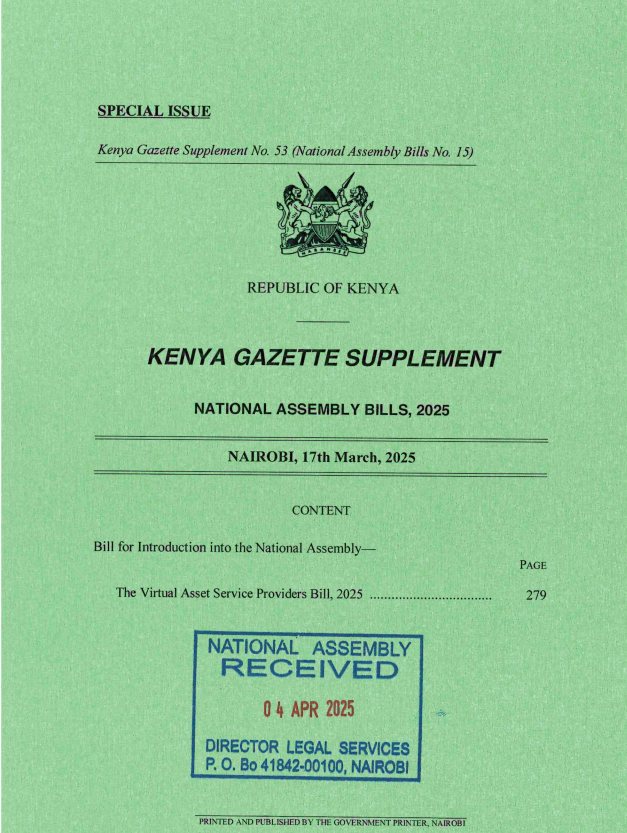NAIROBI, Kenya – The Parliament of Kenya has passed the Virtual Asset Service Providers Bill, 2025, creating the country’s first comprehensive legal framework for the regulation of virtual assets and related services. This legislation provides a clear pathway for the licensing and oversight of cryptocurrency businesses, moving the sector from an informal to a formalized status.
This regulatory action is the result of a multi-agency process, with the following official documents forming the foundation for the law:
- The Virtual Asset Service Providers Bill, 2025 is the primary legislation, available on the Parliament of Kenya’s website: https://parliament.go.ke/node/23602
- The policy foundation was set by the Draft National Policy on Virtual Assets and Virtual Asset Service Providers from the National Treasury in December 2024: https://www.treasury.go.ke/wp-content/uploads/2025/01/DRAFT-NATIONAL-POLICY-ON-VAs-AND-VASPs.pdf
- The need for regulation was informed by the Virtual Assets & Virtual Asset Service Providers Money-Laundering and Terrorist-Financing Risk Assessment Report from the Financial Reporting Centre in February 2024: https://www.frc.go.ke/wp-content/uploads/2024/02/VAs-and-VASPs-ML_TF-Risk-Assessment-Report-1.pdf
What the Virtual Asset Service Providers Bill Entails
According to the text of the Bill hosted at https://parliament.go.ke/node/23602, the legislation establishes a regulatory and licensing regime for entities dealing with digital assets. Its core objectives are:
- To Regulate Virtual Asset Service Providers (VASPs): The Bill mandates that any business offering services such as virtual asset exchange, transfer, custody, or administration must obtain a license to operate legally in Kenya.
- To Protect Consumers and Investors: The law introduces requirements for licensed entities, including the segregation of client assets from corporate funds and the maintenance of transparent operations.
- To Uphold Financial Integrity: As recommended in the FRC’s risk assessment report (https://www.frc.go.ke/wp-content/uploads/2024/02/VAs-and-VASPs-ML_TF-Risk-Assessment-Report-1.pdf), the Bill integrates Anti-Money Laundering (AML) and Counter-Financing of Terrorism (CFT) obligations into the digital asset sector.
- To Provide a Foundation for Innovation: The framework is designed to allow for the growth of financial technology within a structured and secure environment.
Key Regulatory Authorities Overseeing the Sector
The Bill assigns specific oversight roles to existing Kenyan financial regulators, a structure proposed in the Draft National Policy (https://www.treasury.go.ke/wp-content/uploads/2025/01/DRAFT-NATIONAL-POLICY-ON-VAs-AND-VASPs.pdf).
- The Central Bank of Kenya (CBK) is tasked with overseeing the issuance of stablecoins and other virtual assets deemed relevant to the national payment system and monetary stability.
- The Capital Markets Authority (CMA) is assigned to regulate virtual asset service providers, including exchanges, brokers, and platforms facilitating the trading of digital assets.
- The Financial Reporting Centre (FRC) is responsible for monitoring and ensuring compliance with AML and CFT standards across the licensed industry.
Licensing and Compliance Requirements
Sections 12 to 22 of the Virtual Asset Service Providers Bill, 2025 (https://parliament.go.ke/node/23602) outline key operational requirements:
- Local Presence: Companies must be registered in Kenya, maintain a physical office, and operate a Kenyan bank account.
- Know Your Customer (KYC): Licensed firms must implement customer identification and verification procedures.
- Transition Period: The law provides a grace period, specified as six months from its commencement, for existing operators to align their operations and apply for a license.
Background and Policy Context
The push for regulation was data-driven. The Financial Reporting Centre’s 2024 report (https://www.frc.go.ke/wp-content/uploads/2024/02/VAs-and-VASPs-ML_TF-Risk-Assessment-Report-1.pdf) identified the growing adoption of virtual assets in Kenya and assessed the associated financial integrity risks. This report provided the empirical basis for legislative action.
Subsequently, the National Treasury’s draft policy (https://www.treasury.go.ke/wp-content/uploads/2025/01/DRAFT-NATIONAL-POLICY-ON-VAs-AND-VASPs.pdf) articulated the government’s strategic goal to foster innovation while implementing necessary safeguards for the financial system and consumers.
Implications of the New Regulatory Framework
The enactment of the VASP Bill introduces several key changes:
- Legal Clarity: It provides a definitive legal status for virtual asset service providers operating in Kenya.
- Structured Oversight: It establishes clear supervisory roles for the CBK, CMA, and FRC.
- Formalized Compliance: Businesses must now adhere to standardized operational, security, and financial reporting requirements.
Stakeholders can access the official documents and monitor for future updates via the primary government channels:
- Parliament of Kenya: https://parliament.go.ke
- The National Treasury: https://www.treasury.go.ke
- Financial Reporting Centre: https://www.frc.go.ke











